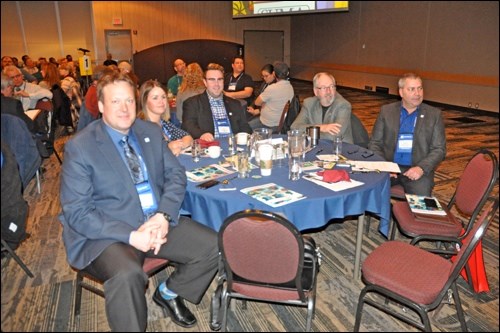There were many new faces on hand at the Saskatchewan Urban Municipalities Association convention in Saskatoon.
Mayors and councils had just come through the 2016 election cycle. While many of those same officials were back for another convention, many mayors and councillors were brand new.
Among the new municipal representatives in attendance at SUMA were mayors from the Battlefords. This was the first SUMA convention for North Battleford mayor Ryan Bater and Battleford mayor Ames Leslie.
Also on hand with North Battleford’s delegation were four of the city’s six councillors: Kelli Hawtin, Len Taylor, Kevin Steinborn and Kent Lindgren. Of the four, Hawtin was the only one on council during the previous term.
While it was his first SUMA convention as mayor, Bater noted it wasn’t a big change from the other times he was at SUMA as a councillor.
“So far, it’s not different at all, actually,” said Bater. He explained that “everybody has an equal vote in anything that we’re deciding on and so, really, so far it’s been the same as when I was a councillor.”
What was most notably different has been the networking aspect, usually an important part of SUMA conventions for delegates. This time, there was the challenge of getting familiar with so many new mayors and councillors from all over the province.
“They told us earlier that 30 per cent of all of the elected councilors and mayors in urban municipalities in Saskatchewan are newly-elected,” said Bater. “So a third of this room are new faces, so that’s interesting.”
The outcome of the municipal election race also meant a change in the executive of SUMA. The former SUMA president Debra Button, of Weyburn, stepped down after she lost her re-election bid for mayor in October.
Randy Goulden, councillor from Yorkton, has served as interim president until a new election could be held.
The main business of delegates on Monday was the vote for the new SUMA president. In that election Gordon Barnhart, town councillor from Saltcoats, defeated Saskatoon city councillor Darren Hill by a vote of 399 to 308, with one spoiled ballot.
Barnhart has formerly served as the province’s lieutenant-governor and also served as interim president of the University of Saskatchewan.
Prior to results being announced, Bater said both were strong candidates. “They both have a lot of experience with governance on various levels, and I’d be happy with either of them,” he said.
Tuesday afternoon was scheduled for votes on a number of convention resolutions. Bater noted there were fewer resolutions than he expected, only eight. He attributes that to the number of new councils elected, shortening the time to prepare resolutions.
One resolution Bater pointed to was one to “stagger” the terms of elected councillors, so that half of them are selected in one election and the other half elected two years later.
The idea is so there would always be some experienced members serving on council. But Bater worried the idea may “create some confusion” in terms of preparing for elections.
Nevertheless, he was interested in seeing how that vote would turn out, given that the resolution was backed by three communities: Kindersley, Rockglen and Maryfield.
“When three municipalities are backing something, obviously there’s some support out there,” said Bater.
Not surprisingly, the North Battleford mayor was concerned about the fiscal situation of the province as outlined in Premier Brad Wall’s address. In his speech to SUMA delegates, Wall indicated the provincial budget deficit was $1.2 billion.
What concerned Bater most was the premier “hinted that public sector salaries are definitely on the table in addressing that deficit,” said Bater.
“It’s obviously something for us to watch in the Battlefords because as a regional service centre there’s a lot of provincial government positions in our community. And those people provide valuable services and they also contribute to the economy because a lot of those are well paying positions. So we’ll be watching that very closely, but it won’t be until budget day that we know the details.”
The mayor also was interested in the premier’s remarks on municipal revenue sharing.
Bater noted communities like the predictability and stability of the current formula, calculated at one per cent of PST.
“It would be easy to argue that everybody in this room wants that formula to be maintained, and the premier didn’t suggest there would be a specific threat to that , except to say ‘everything is on the table’ and that would include that formula.”




